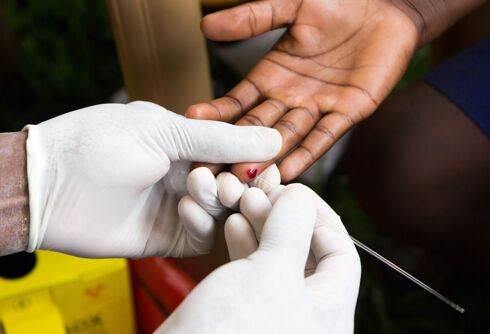In honor of Women’s History Month, we’re highlighting some of the many incredible LGBTQ+ women of both the past and present, women who overcame unimaginable obstacles to change the world.
“I hate bullies. I just hate bullies,” transgender activist Alejandra Caraballo tells LGBTQ Nation. “I was bullied a lot as a kid, I was called a f***ot.”
This difficult past fuels Caraballo’s unwavering dedication to fighting for trans rights. “I’m a trans Latina woman, I have a shared identity with so many of these folks. I just want to help and make sure they can live a life as good as anyone can.”
Related:
LGBTQ+ women are often discouraged from running for office. They’re doing it anyway.
But along the way, they face a myriad of obstacles that gay and bi male candidates more easily avoid.
Never Miss a Beat
Subscribe to our newsletter to stay ahead of the latest LGBTQ+ political news and insights.
Caraballo works day and night – alongside fellow activist Allison Chapman and journalist Erin Reed – to not only combat the increasingly harmful anti-trans legislation being proposed throughout the country but also to give LGBTQ+ people a sense of optimism for the future.
Spearheaded by Reed, the team tracks every piece of anti-LGBTQ+ legislation across the country. All three of their tracking efforts began individually, and they joined forces when they realized their work overlapped.
Together, their work has been instrumental in keeping people aware of harmful legislation that emerges nearly every day, with over 400 anti-LGBTQ+ bills already documented this year. The legislation tracker is regularly cited by prominent news outlets and has become a key resource for those involved in the fight for LGBTQ+ equality. LGBTQ Nation regularly cites these women for their work tracking legislation and also for the invaluable insights they bring to the state of LGBTQ+ rights.
“I help popularize quite a few instances of anti-LGBTQ violence that then get picked up and get national media attention by virtue of my having quite a big platform on social media,” Caraballo said. “That can help shine a light to these things.”
“Beyond that, I’ve been doing a lot of work with journalists and serving as an expert to talk about things like networked harassment, incitement and stochastic terrorism, specifically online around anti-LGBTQ hate speech, specifically in the ways that manifest into real world violence.”
In addition to her work for the LGBTQ+ community, Caraballo is a civil rights attorney and clinical instructor at Harvard Law School CyberLaw Clinic. While serving as a legal analyst for bills that pop up during legislative tracking, she also does quite a bit of work advocating against harmful bills and acting as an expert source for reporters. She spoke with journalists, for example, about Florida’s threat to punish trans folks who try to change the gender listed on their state-issued driver’s licenses.
“Just over a year ago, I testified before Congress and submitted in-depth documentation on the levels of anti-LGBTQ violence that have manifested, and some of the origins of it,” she says. “Additionally, I’ve served as a background source for tons of journalists that are covering this and helping to shape stories and point journalists in the right direction.”
Caraballo names Puerto Rican liberation activist Pedro Albizu Campos as inspiration for her work, along with LGBTQ+ rights activists Marsha P. Johnson and Sylvia Rivera. Paintings of these activists hang on her walls.
“I’m always the saddest that [Johnson and Rivera] are no longer with us and that they didn’t get to see so much of the progress we had,” she explains. “But at the same time, the fierceness – one of the things I found myself gravitating towards was Sylvia Rivera’s speech at the Christopher Street Gay Liberation March in 1972.”
“She just stormed the stage and completely took it over. She was just spitting truth up there, despite people booing her… I think in that way, it’s just to be fierce and fearless, and just go forth and do what I need to do and don’t care about what that means in terms of what others think of me in that way.”
Chapman’s role on the tracking team is similar to Caraballo’s, but as a software developer, she has also created software that helps automate their work.
In addition to legislative tracking, Chapman alerts activists to issues that are immediately concerning.
“I coordinate with activists on the ground and in other states… I see myself in the position as being eyes across the nation on LGBTQ+ legislation and then being able to communicate patterns and things that I am seeing that an activist on the ground in one state might not,” she explains to LGBTQ Nation.
She continues, “I think the biggest impact that I’ve seen is being able to start moving people, and mobilizing local people to fight things. I was able to be a part of the first group raising red flags about the policies in Ohio,” she explained, regarding the proposed Ohio healthcare rules that would have severely limited the ability of adult trans people to transition.
Chapman – who doesn’t hesitate to name Caraballo and Reed as her sources of inspiration – added that getting involved in social justice is all about embracing your strengths.
“I think in the fight for trans rights and LGBTQ+ rights, there’s a place for everyone. Everyone has their place, and you can play into your strengths. For me, this is where I found my strength. I can use software engineering to make my life easier in tracking all this. I started working with [Reed and Caraballo] and learning from underneath them, and I continue to learn from them. It’s been an incredibly rewarding and challenging journey to be where we are now.”
But fighting well also means knowing when to take a break. Chapman emphasizes the need to take time for one’s mental health, stressing the importance of downtime to avoid getting burnt out in the face of so much bad news.
That said, anyone interested in joining the cause need not wait.
“I highly encourage you to start reading bills,” she says. “Go to our spreadsheet and start reading bills, read how we categorize things. Go on to Legiscan and start searching for things. If you find bills, feel free to message them to anybody on our team. My email address is public, feel free to send me an email or send me a message on Twitter.”
She also stresses the need to be prepared for the unexpected – and for the inevitable disappointments that come with fighting for equality.
“It becomes very real when it’s you or your friends or other people that you care about. Be prepared for that the best you can, and no matter how much you prepare you’re not ever going to be fully prepared. I can be prepared all day long for bills to pass, but yet the moment they do you’ll still get this gut feeling of sadness, fear, and devastation.”
Caraballo adds that activists should have a supportive community.
“If you want to do any of this work, have a support system. I would not be able to do what I do without the fortune of having a supportive family, supportive parents. Not saying that everyone needs that to be successful obviously – so many people in the trans community don’t have that… I think it’s important to have that sense of support so that even on the hardest days you have that you can rely on and you can go to for strength and support and comfort.”
She also discusses the necessity of speaking up when you see something is wrong and to always be prepared to advocate for what you believe in.
“Don’t always ask for permission, ask for forgiveness. If you see something happening and you want to try and stop it, like a bill is moving or you feel your state orgs aren’t doing enough, start organizing yourself. You can’t wait and be a bystander, you’ve got to get involved and be active.”
“The other thing is to know your history. One of the things I find most helpful for me is knowing none of this is new. A lot of people feel like this backlash is new, but when you realize the history of the late 70’s and the backlash to trans people back then, the backlash to trans people in Germany in the 30’s. Knowing that this is all the same stuff, it’s just a new coat of paint. Then you realize that history doesn’t repeat itself, but it rhymes… Seek power in your history and the history of our community.”
Editor’s Note: The author of this article works with Chapman, Reed and Caraballo on legislation tracking efforts as of December 2023.
Don't forget to share:
















